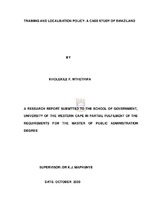| dc.contributor.advisor | Maphunye, K.J. | |
| dc.contributor.author | Mthethwa, Kholekile F. | |
| dc.contributor.other | School of Government | |
| dc.contributor.other | Faculty of Economics and Management Sciences | |
| dc.date.accessioned | 2013-07-09T08:09:19Z | |
| dc.date.available | 2007/04/18 10:14 | |
| dc.date.available | 2007/04/18 | |
| dc.date.available | 2013-07-09T08:09:19Z | |
| dc.date.issued | 2004 | |
| dc.identifier.uri | http://hdl.handle.net/11394/1611 | |
| dc.description | Masters in Public Administration - MPA | en_US |
| dc.description.abstract | The aim of the study was to investigate why it was deemed necessary to train and localise the public and private sectors by the Swaziland government. The efforts began shortly before Swaziland attained independence in 1968. Many of the initiative to localisation started in pre-colonial Swaziland in 1966 leading to independence. The study also examined the drawbacks to training and localisation and how these were overcome. Swaziland inherited and was strongly dependent upon a strongly entrenched cadre of top-level public service and private administrators who were expatriates. The study also examined how far localisation has gone to date. | en_US |
| dc.language.iso | en | en_US |
| dc.publisher | University of the Western Cape | en_US |
| dc.subject | Local officials and employees | en_US |
| dc.subject | Training of Swaziland | en_US |
| dc.subject | Public officers | en_US |
| dc.subject | Civil service | en_US |
| dc.subject | Recruiting | en_US |
| dc.subject | Swaziland | en_US |
| dc.subject | Officials and employees | en_US |
| dc.subject | Selection and appointment | en_US |
| dc.title | Training and localisation policy: a case study of Swaziland | en_US |
| dc.type | Thesis | en_US |
| dc.rights.holder | University of the Western Cape | en_US |
| dc.description.country | South Africa | |

